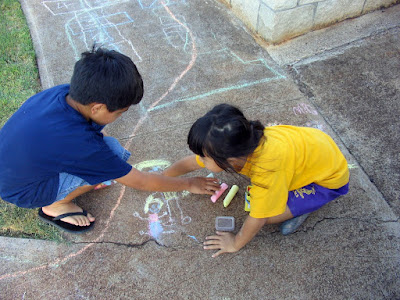
It is thrilling to see an increase in information on brain development in the media. One recently published article in particular is valuable in creating an understanding of the impact of experiences in the early years. This article discusses the critical importance of play and interaction!
The article, The Serious Need for Play, published in Scientific American, refers to numerous studies that demonstrate the value of play. The article points out that play adds to the development of better language and social skills. Evidence also show that play is effective in the reduction of stress. And additionally, play also is shown to make kids smarter.
Too often it is thought that the best way to help children develop is to plan structured activities. David Elkind is quoted in this article saying, “Play has to be reframed and seen not as an opposite to work but rather as a complement.” He also says, “Curiosity, imagination and creativity are like muscles: if you don’t use them, you lose them.”
The Brain Insights activity packets, I have developed, are designed with this understanding of early brain development in mind. For example:
PHYSICAL PLAY
When I am in an active mood, lay on the floor and let me crawl over you. Let me have a fun time while giving me safe physical play time with you.
Studies show gentle rough and tumble play helps the development of the thinking areas of the brain.
TIME TO JUST PLAY
Let me have time to just play, be creative and use my developing imagination. Provide items that are safe for me to use around the house. You might be amazed at the creative things my brain comes up with if I have free play time.
Items to get play started: Put a blanket over a table, give me plastic kitchen containers or utensils, junk mail, packing peanuts, cardboard boxes, etc.
My brain will learn to imagine, and to be curious and creative by having lots of opportunities to just play. Play experiences with real things on my own or with friends helps me also develop problem solving skills.
TIME TO EXPLORE
In addition to the time we spend playing together, let me have time to also play on my own. Watch for times when I am very interested in an activity and let me enjoy it as long as I am interested.
My brain needs to explore things over and over. When I do this my brain learns what to expect from different things I try. Playing alone gives me important time to discover for myself how things work.
You can have play ideas right in your pocket with Brain Development Activity Packets! Even though your life is busy you can have fun times with your child at any time! (In English and Spanish)
The article, The Serious Need for Play, published in Scientific American, refers to numerous studies that demonstrate the value of play. The article points out that play adds to the development of better language and social skills. Evidence also show that play is effective in the reduction of stress. And additionally, play also is shown to make kids smarter.
Too often it is thought that the best way to help children develop is to plan structured activities. David Elkind is quoted in this article saying, “Play has to be reframed and seen not as an opposite to work but rather as a complement.” He also says, “Curiosity, imagination and creativity are like muscles: if you don’t use them, you lose them.”
The Brain Insights activity packets, I have developed, are designed with this understanding of early brain development in mind. For example:
PHYSICAL PLAY
When I am in an active mood, lay on the floor and let me crawl over you. Let me have a fun time while giving me safe physical play time with you.
Studies show gentle rough and tumble play helps the development of the thinking areas of the brain.
TIME TO JUST PLAY
Let me have time to just play, be creative and use my developing imagination. Provide items that are safe for me to use around the house. You might be amazed at the creative things my brain comes up with if I have free play time.
Items to get play started: Put a blanket over a table, give me plastic kitchen containers or utensils, junk mail, packing peanuts, cardboard boxes, etc.
My brain will learn to imagine, and to be curious and creative by having lots of opportunities to just play. Play experiences with real things on my own or with friends helps me also develop problem solving skills.
TIME TO EXPLORE
In addition to the time we spend playing together, let me have time to also play on my own. Watch for times when I am very interested in an activity and let me enjoy it as long as I am interested.
My brain needs to explore things over and over. When I do this my brain learns what to expect from different things I try. Playing alone gives me important time to discover for myself how things work.
You can have play ideas right in your pocket with Brain Development Activity Packets! Even though your life is busy you can have fun times with your child at any time! (In English and Spanish)












Comments
3 Responses to “THE INCREDIBLE VALUE OF PLAY IN EARLY BRAIN DEVELOPMENT!” Post Comments (Atom)
Post Comments (Atom)
Post a Comment |
"let me have time alone". Awesome - meaning packed phrase. Parents today seem to beleive that childrens lives need to be structured every moment of the day. If not - parents believe that they are not being attentive. Although children need structured play and family time - this must be with in balance. Young children develop executive functions through play. This is an unrestricted time when there imaginations soar and they are not pressured to (play by the rules) but use the gift of trial and error. The downfall and result of early childhood overstructuring - are older children who can't think independently and problem solve. They are used to having days totally scheduled by others, and being encouraged to never color outside the lines. Assisting and encouraging children to use their imagination is a longterm gift. These children will grow up with the capability to successfully problem solve. Do we not leave work after a stressfull day and need alone time? A young child who has spent the day in daycare, preschool, at birthday party, etc. experiences the need do descalate as well as adults. What a gift to let them do their (job) - which is to be a young child, explore, and learn.
February 14, 2011 at 10:54 AMWhen you get bored
March 23, 2011 at 1:25 AMFind a patch of grass and look.
Don’t ask me where
The one you search for and find will be perfect
When you get bored get a magnifying glass
Don’t ask me what you should do if you don’t have one
Figure out from the alternatives available to you
When you get bored close your eyes and touch, listen, feel or smell
Don’t ask me which
Trust your senses
When you get bored jump on it
Don’t ask me what to do if your foot hurts
Come to your own intelligent decision
When you get bored
Take off your shoes and walk on it
Don’t ask me what to do if the ground is muddy
Analyze your own situation and make a rational decision
When you get bored
Imagine
Don’t ask me what
Draw on your experience
When you get bored
Get something to sketch with and come back
Don’t ask me if you have to draw or if you can paint, sculpt, or take a photo
Create something
When you get bored
Get something to write with and come back
Don’t ask me what to write, if it has be be in pencil or cursive
Predict what I will say and move forth on your own
When you get bored
Find another patch of grass
Don’t ask me if it has to be a patch of grass
Decide for yourself and I will be proud of your wise decision
Excellent blogs. I really appreciates with your article. thanks for sharing useful information.
February 6, 2015 at 6:27 AMChildren Brain Development | Brain classes for kids
Post a Comment